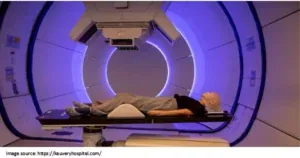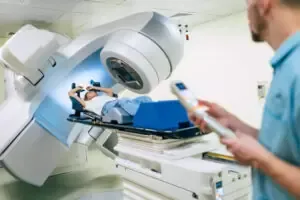Radiation Therapy in Bangalore
In recent years, the understanding of proposed hallmarks in the development of cancer treatment has made notable progress. Cancer treatment includes radiation therapy, surgery, chemotherapy, immunotherapy, and hormonal therapy.
About 50% of all cancer patients receive radiation therapy at some point during their illness, making it a crucial part of cancer treatment. In addition, 40% of curative cancer treatment is radiation therapy. The primary objective of radiation therapy is to kill the tumour cells while not damaging the adjoining normal organs.
You can receive expert advice on a wide range of advanced cancer treatments at MACS Clinic, including surgery, chemotherapy, and radiation therapy in Bangalore. The hospital comprises a team of expert surgical oncologists, radiation oncologists, and medical oncologists.
First, let’s understand,
What is Radiation Oncology?
Radiation Oncology is a branch of medicine wherein cancer cells are killed or destroyed using high-energy particles or waves like X-rays, electron beams, gamma rays or protons.

What is Radiation Therapy?
Our body cells are born, perform the assigned function, multiples/divide to produce their progeny and finally die off as programmed. But compared to most normal cells, cancer cells are damaged cells that grow and divide faster and uncontrollably with no intrinsic programming to die. Radiation therapy works by making small breaks in the DNA of these cancerous cells.
These breaks in DNA stop the growth and division of cancer cells and ultimately lead to their death. Radiation can also cause temporary damage to nearby normal cells, but most recover and resume their normal functions in due course of time.
Chemotherapy and other cancer-fighting medications taken orally or through the veins expose the entire body. In contrast, radiation therapy is a local treatment that targets only a particular area of your body. For example, if you have lung cancer, you will only receive radiation to your chest and not the rest of your body.
Radiation therapies are designed and delivered in such a way that it kills cancer cells while causing minimal harm to nearby healthy cells. Sometimes radiation therapy is the only course of action.
Additionally, it may be given with other treatments like surgery or chemotherapy to:
- Shrink the tumour to make it as small as possible before surgery.
- To detach tumours from nearby structures making them more operable.
- Prevent the recurrence of cancer following surgery or chemotherapy.
- Relieve tumor-related symptoms like pain,obstruction, bleeding, etc.
- To prevent skeletal events such as fracture.
- Treat cancers that surgery cannot remove.
Now, let’s look at,
Fill Out the Form Below
Different Types of Radiation Therapy
IORT is often given when a tumour needs surgical removal. Radiation is given to the area of the tumour cavity before the surgeon closes the incision after the tumour has been removed. IORT is administered only to select patients who meet all the criteria as set by the treating team. The benefits of IORT over external radiation are as follows:
- Only the tumor area is targeted to minimize damage to healthy tissue.
- There is only one radiation dose administered bringing down the total treatment time drastically.
- Delivers a smaller yet equally effective dose of radiation.
It is a form of internal radiation therapy in which the oncologist inserts radiation-containing needles, specialised applicators, seeds, ribbons, or capsules into or near the tumour.
Hence with brachytherapy, we are able to deliver extremely large amount of doses to tumours with minimal damage to nearby structures. Typically, cancers of the head and neck, breast, cervix, uterus, prostate, food pipe and eye are treated with it with or without external radiotherapy.
Types of Cancer treated with Radiation Therapy
Radiation therapy is beneficial in the treatment of several types of cancers, including:

Fill Out the Form Below
Side Effects of Radiation Therapy
Radiation therapy affects everyone differently. Your doctor might tell you a spectrum of side effects before the treatment. It’s important to note that you might end up having a few or no side effects at all or may experience something of the usual.
Most of the side effects are temporary and manageable; chronic persistent ones are few.The severity and number of side effects vary depending on the individual propensities, location, spread and type of cancer and general health. In addition, your condition before cancer diagnosis may also impact your response to treatment.
Some of the common side effects of radiation therapy include:
More important are side effects that are specific to the treatment site. For eg., A person undergoing radiation for a head/neck tumour could have difficulty in swallowing, oral ulcers, decreased saliva production etc while a person undergoing treatment for cervical cancer would not experience most of the side effects. Their side effect profile would consist of change in bladder or bowel habits, abdominal pain etc.
We usually meet our patients at least once a week or even more often if need be, to discuss the side effects or even preventing some of the anticipated side effects. Inform your healthcare provider if you experience radiation side effects. Sometimes, even small changes can have significant impacton limiting side effects. You might get suggestions or medicines to help with the discomfort.
Benefits of Radiation Therapy
Almost any part of the body can benefit from radiation therapy in treating various cancers. Radiation therapy is sometimes the only therapy required for certain types of cancers.
Radiation therapy has several advantages, including:

